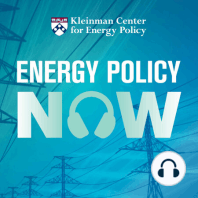38 min listen

The Potential, and Risks, of Nature-Based Climate Solutions
The Potential, and Risks, of Nature-Based Climate Solutions
ratings:
Length:
44 minutes
Released:
May 4, 2021
Format:
Podcast episode
Description
Nature-based climate solutions can play a major role in climate change mitigation and adaptation. But biodiversity risks, and community impacts, loom large.---Technology often seems to be the focus when conversation turns to solutions to address climate change. Clean energy, carbon capture and even geoengineering dominate headlines and attract the attention of climate-focused investors. When it comes to protecting coastal communities, infrastructure projects like sea walls and raised roads likewise grab attention, particularly after extreme weather events.Yet, nature itself is likely to play just as important a role as engineered solutions in our efforts to slow climate change and navigate its worst impacts. Today, scientists and some policymakers are aggressively exploring the potential of nature-based solutions to help us slow and adapt to climate change.Nathalie Seddon, a professor of biodiversity at the University of Oxford, discusses the promise, challenges and potential moral hazards of nature-based climate solutions. Seddon explains what qualifies as a nature based-solution, and looks at the community and biodiversity impacts that need to be taken into account when putting nature-based solutions into action. She also looks at efforts to quantify the benefits of natural climate solutions as a means to accelerate investment.Nathalie Seddon is a professor of biodiversity at the University of Oxford and founding director of the Nature-based Solutions Initiative.Related ContentClimate Adaptation Strategies: How Do We “Manage” Managed Retreat? https://kleinmanenergy.upenn.edu/research/publications/climate-adaptation-strategies-how-do-we-manage-managed-retreat/ The Best Local Response to Climate Change is a Comprehensive Efficiency Plan. https://kleinmanenergy.upenn.edu/research/publications/the-best-local-response-to-climate-change-is-a-comprehensive-efficiency-plan/Balancing Renewable Energy Goals with Community Interests https://kleinmanenergy.upenn.edu/research/publications/balancing-renewable-energy-goals-with-community-interests/
Released:
May 4, 2021
Format:
Podcast episode
Titles in the series (100)
The Many Fronts of Trump's Environmental Deregulation Effort by Energy Policy Now